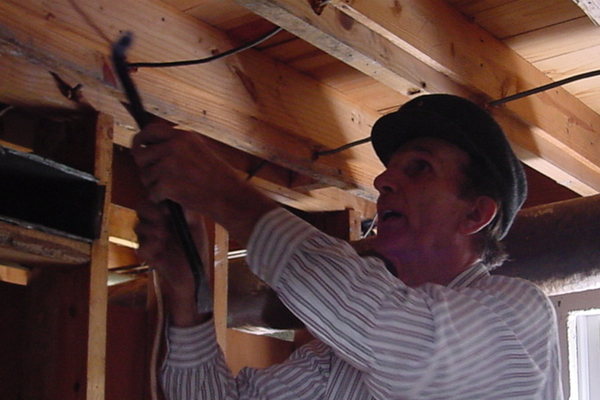Who Will Build America's Future?
Building Trades Crippled
America is in real trouble, but you’re not seeing this headline on the front pages of any news site for the reasons I’m about to tell you. It’s not about war or poverty or hunger. The reason America is in big trouble? We’re not raising our kids to build. Anything.
The building trades in this country are suffering a tremendous shortfall of young talent ready to rise up through the ranks. It’s a known fact in the industry, but chances are you don’t even know about this crisis. Programs like Irwin Tools’ National Tradesmen Day do a good job at shedding some light on professions that otherwise get little recognition, but those “atta-boys” are becoming fewer and further between.
The reasons for this looming crisis are many, but to avoid becoming overwhelmed, let’s take a short look at just a few. Maybe we can get the ball rolling in the right direction.
Lost Industrial Arts
When I was in junior high and high school, we were required to take at least one industrial arts elective. Many looked at these classes as “easy A’s”, but in retrospect they were much more valuable than we thought (another reason why paying attention to history is so important). I chose woodworking in 7th and 8th grade and auto shop in high school. Ironically, I learned more to prepare me for life in those 2 classes than I did in my others.
I still have at least one project from those days in shop, and a whole list of skills that I began to cultivate (albeit unknowingly).
What ever happened to Wood Shop? Auto Shop? Metal Shop? Hell, even Home Economics would be a welcome return to something resembling ‘normal’ in our schools. Instead, our schools have shifted their focus to programs that reward higher written test scores with more state and federal money. Naturally, that’s where all the educational efforts have been directed.
Sure, this country needs doctors (although there won't be much money in that profession if we continue on our current path), teachers (whose curricula have begun to be dictated by federal bureaucrats and dollars, and aren’t necessarily in the best interest of anyone), and lawyers. Actually, we could do with fewer of that last group, but I digress - and I know I'll catch some heat for that one.
One visit to almost any classroom in this country and you’ll soon realize that not every child is going to benefit from college, nor would they likely be accepted if it came right down to honest aptitude scores. There will always be winners and losers in this world. The secret is to pick the game at which you’re likely to excel, give it your best shot, work hard, and say a prayer every now and then. Make your own success, in other words. It’s possible.
The Stigma Of Hard Work
Ashton Kutcher said it best recently, “I believe opportunity looks a lot like hard work.” That gem was followed by, “I never had a job in my life that I was better than. I was always just lucky to have a job. Every job I had was a stepping stone to my next job and I never quit my job before I had my next job.” Where has he been all this time? I mean, I'm glad he spoke out, but this should have been screamed from rooftops years ago!
That’s where I think we’ve missed the boat. A large number of our kids don’t know the meaning of hard work. Maybe it’s because our lives have become so busy that we simply haven’t budgeted the time to teach? I’m not pointing fingers, because I feel just as guilty as the next person in that sense. The point is, we need to change that. And we can.
My Dad, The Craftsman
My father passed away this year, unexpectedly. He was a master craftsman, but spent his life chasing jobs and the almighty dollar as a salesperson in real estate, and insurance. He even went to law school. Had I been able to give him advice when he was a younger man, I would have said that his true skill set lay in working with his hands - building things. Ironically, I believe to this day that had he been a cabinet maker, he would have died a very wealthy man.
As a kid, I spent time watching him work around the house, doing home improvement projects with little more than a couple of screwdrivers, a wrench, and a rusty hand saw. I don’t think he ever owned a complete set of shiny new tools. He neither wanted nor needed them. The real masters don’t - they can work wonders with a handful of implements.
His father was a steam fitter. In today’s vernacular, we’d call him an HVAC guy. Maybe my dad’s dad told him that he wanted him to “have a better life than his – to get an education and go into sales"? I'll never know, but I think you’re getting the picture. We all want our kids to have “better lives” than we did, but we also have to recognize and nurture their own strengths, passions, and skills.
My dad never pushed me toward home improvement, but I was involved in it from a young age. My brother-in-law's father, Roger Warren, was a contractor in the Northeast and would pay me a few cents to pick up nails and debris on his jobs. In retrospect, it was a good way to keep a chatty kid at arm's length, but it had an impact on me.
To this day, I'm fascinated with the process of building, the art of design and engineering, and I know the satisfaction that a person can feel when they step back from a completed project and realize they created something. It's really good for the soul.
The Building Trades
The National Center for Construction Education and Research (NCCER.org) hired me to do some promotional videos for their Build Your Future campaign a few years ago. They're primarily a text book and training manual organization, but they also promote the Trades in their efforts to keep our building engine running. As part of their marketing program, I got to visit trade schools around the country, fascinating commercial job sites, and I had the chance to speak with men and women skilled in various trades. These are some of the hardest-working, smartest people on the face of the planet. You'd be proud to have your kids work for and with them.
College is not the answer for everyone, no matter what the government or politicians continue to say. Trade schools are just as noble, they’re immensely less expensive, and most graduates not only have a marketable set of skills when they leave, but a list of job offers.
What Can We Do?
There are no easy answers and this problem isn’t going to get solved overnight, but as I’m fond of asking, “How do you eat an elephant? One bite at a time.”
- Work with your kids to build little things. It doesn’t matter if you don’t know which end of the hammer to hold, you can buy a kit (Rockler sells several that are simple and fun). See if building stuff float’s your kid’s boat. You may discover they have a real talent for creating. Heck, you may discover your own hidden talents at the same time.
- Take an industrial arts class at a community college, or see about teaching one. Be ready to fight some bureaucracy, though. A friend of mine was a wood shop teacher and had to jump through hoops to get things done. If you enjoy a good fight and want to make a difference, go for it!
- Find out why your kid’s school doesn’t offer any shop classes, if they don’t. Probably not an easy fix, but at least you’ll be educating yourself in the reasons why we’re not a nation of builders anymore. It might inspire you to help fix it.
- Looking for a second job? Need extra money? Stop by a construction site (residential, not commercial) and ask for an application. Even if you have no experience, they might be looking for drivers or runners or people who can lift heavy things. That’s called a foot in the door. We used to call it apprenticeship.
- Buy a book, some basic Irwin tools, and fix some stuff around your house. I feel a little guilty plugging my own book (Spend a Little, Save a Lot Home Improvement), but that’s why I wrote it – to teach people who don’t think they have the know-how some basic skills. Trust me, I didn’t do it for the money. If you buy it, I’ll even sign it for you. When you’ve learned some things, teach someone else. Pay it forward.
- Appreciate the guys and gals who get their fingernails dirty. Thank them for a job well done. Understand that there’s no sin in working an honest 8-10-12 hour day.
It’s pretty easy to do nothing, but ponder an old friend of mine’s favorite phrase, “If you’re not part of the solution; you’re part of the problem.”If we all work as a team and lift just a little bit of the weight of this hefty problem, we just might have a shot at fixing it. In that case, we actually would ALL be winners.








